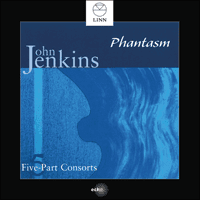Program: #18-14 Air Date: Mar 26, 2018
To listen to this show, you must first LOG IN. If you have already logged in, but you are still seeing this message, please SUBSCRIBE or UPGRADE your subscriber level today.
The prolific Phantasm Ensemble gives us anthems by Tomkins, consorts by John Jenkins, and a new recording of the complete consort music by Christopher Tye.
I. Christopher Tye: Complete Consort Music (Phantasm). Linn CD CKD 571.

The English composer is especially bold in his metrical and harmonic experiments embraced within his mystical but surprisingly approachable instrumental works.
There are pieces depicting the biblical Rachel weeping for her children, an In Nomine counted in lengths of five beats (unheard of before the nineteenth century) and obsessional works – such as Sit fast – which test the rhythmic skills of musicians with passages of dizzyingly modernist metrical complexity.
Phantasm take a radically different approach to previous recordings, delivering a performance that brings out the music’s ceaseless energy, rhythmic articulation, and provocative harmonies – in short, one that highlights Tye’s insights as music for today.
Phantasm performed works by Christopher Tye at Austria’s Trigonale Festival and London’s Wigmore Hall in September and October 2017 respectively.
From Gramophone: A contemporary of Tallis and Sheppard, Christopher Tye was a composer apart. His ear for harmony, his eye for a musical line, seem to have been guided by a different logic to those around him. There’s no doubting his architect’s instinct for musical form but his architecture is more Frank Gehry than Inigo Jones – wilful, playful, iconoclastic and often as baffling as it is beautiful. This collection of his complete consort music throws up surprise after surprise – a revelation of a recording that offers a startling perspective on a familiar musical landscape.
Phantasm’s craggy, deep-dug performances follow the composer’s instructive titles – ‘Hold fast’, ‘Follow me’, ‘Believe me’ – to the letter, gamely celebrating the oddities as well as the felicities of works whose fixation with 54 notes of plainchant by John Taverner (taken from the Benedictus of his Missa Gloria tibi Trinitas) has never fully been explained. Discovering the unexpected sensuality of the In nomine ‘Round’, the yelping, insistent plaints of the In nomine ‘Cry’ and the provocative dramatics of the In nomine ‘Re la re’, Phantasm are skilled musical tour guides to Tye’s challenging terrain.
In nomine a4
In nomine 'Trust'
Composer Info
Christopher Tye, Thomas Tomkins, John Jenkins
CD Info
CD CKD 571, CD OA CD9040 D, CD BKD 557

